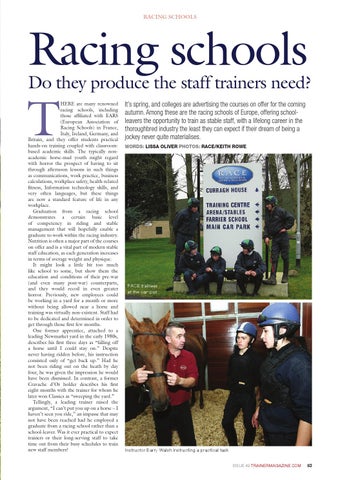RACING SCHOOLS
Racing schools
Do they produce the staff trainers need?
T
HERE are many renowned racing schools, including those affiliated with EARS (European Association of Racing Schools) in France, Italy, Ireland, Germany, and Britain, and they offer students practical hands-on training coupled with classroombased academic skills. The typically nonacademic horse-mad youth might regard with horror the prospect of having to sit through afternoon lessons in such things as communications, work practice, business calculations, workplace safety, health-related fitness, Information technology skills, and very often languages, but these things are now a standard feature of life in any workplace. Graduation from a racing school demonstrates a certain basic level of competency in riding and stable management that will hopefully enable a graduate to work within the racing industry. Nutrition is often a major part of the courses on offer and is a vital part of modern stable staff education, as each generation increases in terms of average weight and physique. It might look a little bit too much like school to some, but show them the education and conditions of their pre-war (and even many post-war) counterparts, and they would recoil in even greater horror. Previously, new employees could be working in a yard for a month or more without being allowed near a horse and training was virtually non-existent. Staff had to be dedicated and determined in order to get through those first few months. One former apprentice, attached to a leading Newmarket yard in the early 1980s, describes his first three days as “falling off a horse until I could stay on.” Despite never having ridden before, his instruction consisted only of “get back up.” Had he not been riding out on the heath by day four, he was given the impression he would have been dismissed. In contrast, a former Cravache d’Or holder describes his first eight months with the trainer for whom he later won Classics as “sweeping the yard.” Tellingly, a leading trainer raised the argument, “I can’t put you up on a horse – I haven’t seen you ride,” an impasse that may not have been reached had he employed a graduate from a racing school rather than a school-leaver. Was it ever practical to expect trainers or their long-serving staff to take time out from their busy schedules to train new staff members?
It’s spring, and colleges are advertising the courses on offer for the coming autumn. Among these are the racing schools of Europe, offering schoolleavers the opportunity to train as stable staff, with a lifelong career in the thoroughbred industry the least they can expect if their dream of being a jockey never quite materialises. WORDS: LISSA OLIVER PHOTOS: RACE/KEITH ROWE
RACE trainees at the campus
Instructor Barry Walsh instructing a practical task ISSUE 49 TRAINERMAGAZINE.COM
EUROPEAN TRAINER ISSUE 49 SCHOOLS.indd 53
53
28/03/2015 12:04
